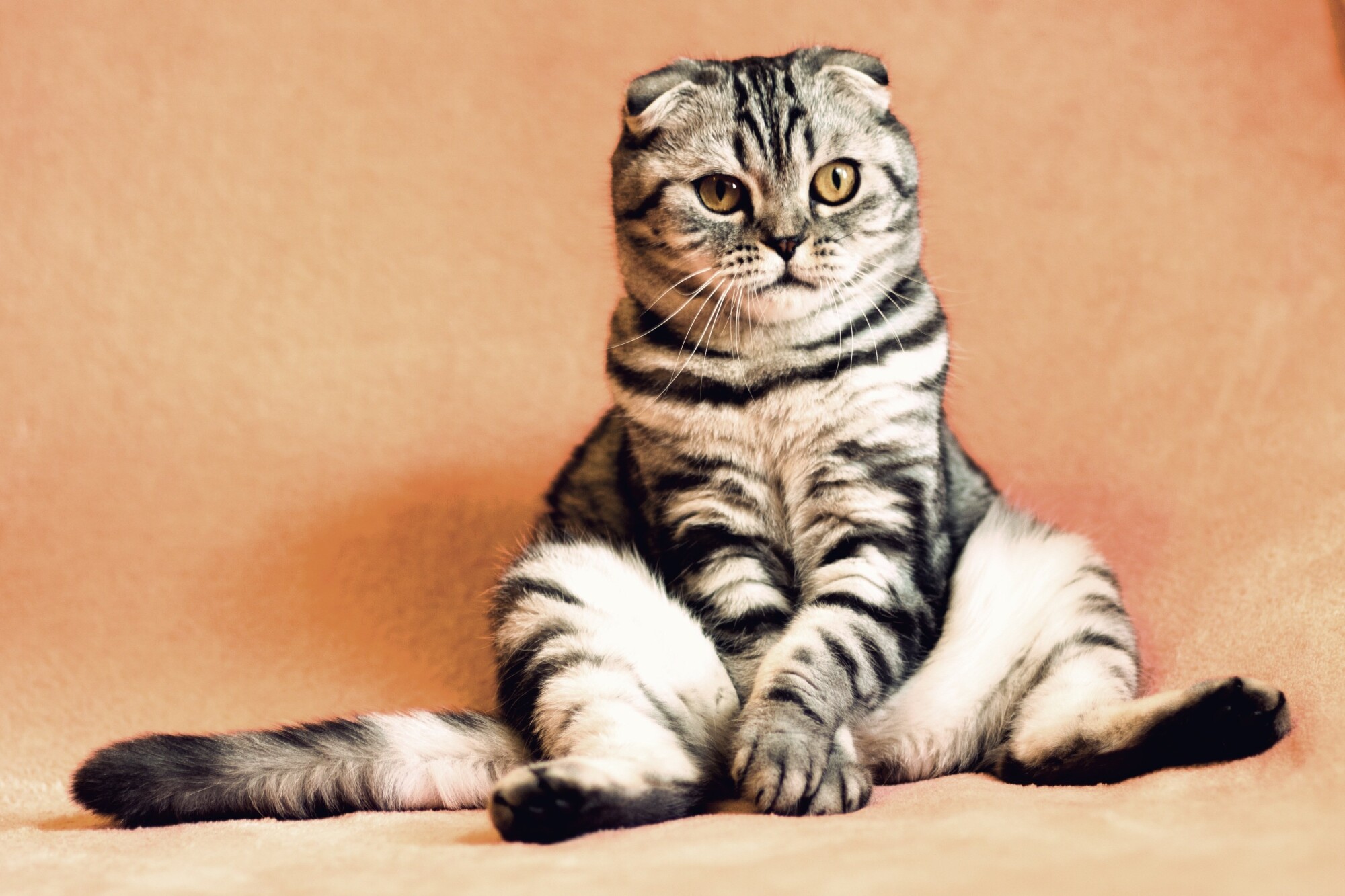If you have a cat at home, you know the feeling of coming home and wrinkling your nose at that awful stench of cat spray. Cats spraying outside to mark their territory is quite normal. However, if you notice them spraying in the house, that is likely a sign that something is wrong.
You may be thinking to yourself, “When do male cats start spraying? Is it avoidable?” and many other questions. Like most domesticated animal behavior, it is trainable.
Don’t feel too disheartened; you didn’t fail as a pet owner. This behavior is pervasive among almost all cats, especially the male ones.
While both male and female cats partake in this act, male cats are more notorious for doing so. Understanding your cat and what prompts them to release is the first step for correction or prevention. Read all about cats’ spraying behavior and more in this handy guide.

Contents
At What Age Do Cats Start Spraying?
Cats tend to spray once they reach sexual maturity. Sexual maturity is at six months for most cats, but it ranges between 5 to 8 months old. Before this period, your cat’s kitten body is busy developing.
Think of them as puberty-stricken teenagers who are full of raging hormones and navigating high school. Kittens don’t care too much about territory, aggression, and mating. These three are the primary reasons why your cat sprays in the first place.
Your male cat’s body system is too busy preparing for the onslaught of adult cat hormones to spray. However, once sexually mature, the floodgates open. By floodgates, we mean the spray glands.
Spraying is like coming of age. Like humans, cats get pretty stinky during puberty.
Why Do Cats Spray?
We all love a cat’s cute meow, and you as a cat owner may even meow back! It conveys emotions like affection, hunger, annoyance. Cats are expressive little creatures, and we love that about them.
Cats spray as a form of communication. However, did you know that cats don’t meow at each other in the wild?
Meowing at their humans is one of many learned behaviors. They learned that meowing is the best way to communicate through centuries of domestication. Humans should be thankful they chose the least pungent means of communicating with us.
They meow at their mother while they are dependent little kittens in need of milk and warmth. After this, they grow out of that habit.
However, cats don’t only communicate through meowing. Furthermore, cats don’t only communicate with you: they have other cats to talk to. That’s what the magic of scent is for.
What Is Cat Spray?
If you’re wondering, “What is cat spray in the first place?” It’s your cat’s signature scent. It just so happens that the overpowering smell of urine is what humans perceive.
Your cat nuzzles you, rubs up against you, and headbutts you. Sometimes your cat may even wrap his tail around your leg. When they do this, they are marking you with their scent.
Don’t worry, though; your cat isn’t likely to spray on you. Cats have glands in their anterior and posterior regions. When a cat creates a scent map with its glands, they use different parts of their body.
For instance, they tend to rub their cheeks in places where they feel safe, like their favorite person.
However, cheek glands don’t always cut it for tougher spots like the streets. So, they often reserve spraying for places where they feel threatened.
Cat spray is different from urine. While it contains urine, it’s also laden with pheromones and other cat hormones. The spray is something other cats “read” with their noses when they come across it.
When Do Male Cats Start Spraying?
Every male cat reaches that certain age when they start spraying. However, there is no definite answer because cats spray for various reasons. Here are some of them.
1. Mating
It isn’t a coincidence that spraying begins at sexual maturity. Cats spray as a signal to other cats that they are single and ready to mingle.
The spray acts kind of like their calling card. By injecting their scent, they hope that females within a smelling radius know where to look.
Since the spray is chock-full of pheromones, other cats are privy to more information. A female cat’s spray has ample information about where they are in their reproductive cycle.
They tell other cats when they are in heat, also known as their estrous phase when they are capable of breeding. Although, female cats spray at much more seldom frequencies than their male counterparts.
Spraying tells other cats in the area, “Hey! I’m here! I’m looking for a mate!” It lures in females while warding off other male suitors.
If you’re wondering, “When do male cats start spraying?” notice if loud meowing and yowling accompany the behavior. Your male cat spraying could be a sign of your cat looking for love.
2. Territory
In the iconic sunrise scene from the Lion King, Mufasa once took young Simba to the peak of Pride Rock. Mufasa told the young one, “Everywhere the light touches is our kingdom.”
Cats don’t forget their wild ancestry. They think that way, too. Except that instead of what the light touches, their kingdom is bound by what their spray touches.
Cats know how to share. Some cats are friendly, social, and more than happy to share. However, even if they know how to share, sometimes, they don’t want to.
Even the friendliest of cats often like to maintain their personal space. When they feel threatened, cats get very territorial and aggressive. You’ll notice this more in outdoor cats than in indoor ones.
Outdoor cats tend to be very protective of their turf. It’s a big neighborhood there, and they have to mark what’s theirs. When the scent fades, they top it off to remind other cats to back off.
If you take your cat outdoors, you might notice him spraying the corners of your house or the perimeter of your yard. You might recognize the classic tail wiggle, upright stance, and sprinkle on a vertical surface.
Cats aren’t exactly experts on confrontation. Spraying allows them to warn other cats instead of brawling it out.
Trespassing cats often result in a bit of a tussle. This show of dominance is how your cat claims and maintains his space.
Indoor cats trying to maintain their personal space often attempt spraying. They do this, especially in the presence of other cats in the household. However, over time, and often when they realize that the other cat crossing their paths is inevitable, they give up.
This development often comes when they understand that other cats in the home aren’t a threat to their survival. Grouchy lone cats learn to deal with it. That is why when indoor cats spray; it may be an indicator that something is wrong.
3. Stress
Indoor cats that spray likely experience some sort of stress. There is a multitude of reasons why a cat feels stressed out. One of the triggers is social stress like overstimulation, a new cat, or meeting new people.
Changing your routine or living composition is also a potential source of stress. Some cats develop a sense of fear of losing their home or territory.
The way they restore this feeling of safety is by spraying. Spraying restores their familiar scent and reaffirms their sense of territory. The act alleviates their anxiety at the moment, but it has a chance of developing into a bad habit.
Thinking that your cat is feeling stressed because of something you did is an awful feeling. Try to reduce social stresses on your cat as a form of amelioration.
What Can You Do About It?
It’s possible to reduce spraying behavior or to stop it entirely. This is via spaying or neutering your cat.
It does matter when you get your cat neutered, as the earlier the intervention, the more promising the results. If your cat gets a taste of spraying, they might attempt it even after the neutering process, albeit much less frequently than before.
Neutering your cat before sexual maturity is the safer way to prevent spraying behavior altogether. If they don’t know what it feels like, they won’t know what they’re missing.
Spaying also eliminates the associated behaviors of spraying, like aggression and hypersexuality. As a result, they won’t feel as territorial. Your female cats won’t yowl as much, if at all, and your male cat won’t go sprinting out the door in search of a mate.
Spaying your cat also offers numerous benefits related to cat sexuality.
Know When Your Cat Sprays and Understand His Behavior
Spraying is your cat’s silent means of communication. This behavior begins when they reach sexual maturity at six months old and terminates for the most part when they get spayed. They spray when they want to mark their territory, to signal readiness to mate, and when they feel stressed.
Thank you for reading our article; we hope it answers the question, “When do male cats start spraying?” If you want to learn more about feline behavior and how to train your furry friend, check out our other blogs. Get them spayed to avoid the spray!




